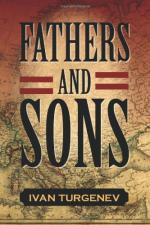|
This section contains 2,013 words (approx. 7 pages at 300 words per page) |

|
Nihilism in Ivan Turgenev's Fathers and Sons
Summary: Ivan Turgenev's feelings about Nihilism are displayed through the book "Fathers and Sons" and are examined in this essay. In particular, Turgenev did not mean for the tern "nihilists" to classify only those who believed in nothing, but he used it as a generalization for all the radicals of the day. By showing the faultiness of the actual philosophy of nihilism Turgenev was bashing all anarchistic, communist, abolitionist and other similar movements.
Ivan Turgenev's Fathers & Sons is a novel which showcases the political tension between radicals and conservatives in pre revolution 1850's Russia. Turgenev was a political activist in Russia and had written several political novels and short stories before Fathers & Sons, the most influential of which being the "Sportsman's Sketches", which many credit with convincing Tsar Alexander II to liberate the serfs of Russia. Turgenev was an advocate of the westernization of Russia but believed that change should come about gradually instead of rapidly as many other activists of the day. Turgenev coined a term for the Russian radicals, "Nihilists." Turgenev saw the ideas of some of these radicals as silly and the opposite of what needed to happen, which is what drove him to write the Book Fathers & Sons which is meant to show that "nihilism" is a faulty philosophy and just isn't practical as can be seen...
|
This section contains 2,013 words (approx. 7 pages at 300 words per page) |

|


